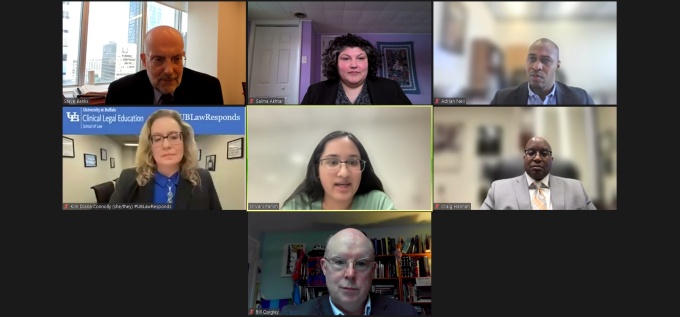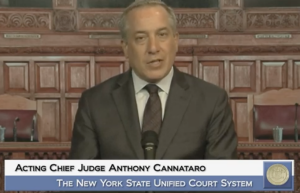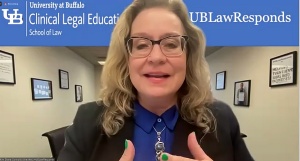
UB Law co-hosts state-wide conference focused on civil justice issues
A signature strength of UB School of Law—its focus on access to justice—got statewide exposure recently as the law school hosted a vibrant conference on the issue.
Titled “Cultivating Civil Legal Justice Leaders to Address the Structural Challenges of Poverty, Injustice and Inequality,” the virtual conference brought together law school faculty, students, judges, and practitioners from across the state to look at how law schools can inspire students to represent clients with limited resources in the civil legal system.
It was the first time that UB Law has co-hosted the annual conference, now in its 11th year, in partnership with the New York State Permanent Commission on Access to Justice. At UB, the planning was led by members of the school’s Clinical Legal Education program, including Professor Kim Diana Connolly, vice dean for advocacy and experiential education and Elisa Lackey, the clinic program’s senior managing director. Connolly was recently appointed to serve as a member of the state-wide Commission.

Hon. Anthony Cannataro, Acting Chief Judge of the State of New York, delivering introductory remarks.
While criminal defendants have a constitutional right to assigned counsel, citizens in civil matters enjoy no such guarantee. Yet the need is great: according to Justice Anthony Cannataro, acting chief judge of the New York Court of Appeals, nearly 14 percent of New Yorkers live in poverty. During opening remarks, Justice Cannataro said, “Undeniably, low-income New Yorkers and disadvantaged populations still have an enormous need for civil legal representation,” adding that such cases can be life-changing when they involve such matters as child custody, eviction, mental illness and access to health care.
One solution is the work of law school students on behalf of civil clients. In her remarks, UB Law Dean Aviva Abramovsky noted that “last year alone, our students provided more than 41,000 hours of pro bono service through our clinics, externships, practica, and pro bono programs.”

Professor Kim Diana Connolly participating in the keynote discussion.
“At UB School of Law, access to justice is at the heart of everything we do,” the dean said. “As a public law school, we know we have a moral responsibility to address disparity in our communities and to work with our community partners to promote positive change.”
A keynote roundtable discussion included both Connolly and a UB Law alumnus, Hon. Craig D. Hannah ’95.
“Our job is to connect people with hopes and dreams with the people with ways and means,” said Hannah, a state Supreme Court judge in the Eighth Judicial District. “We can make sure that when we serve them, they’ll leave much better than how we first saw them.”
And the work, he said, can be tremendously affirming. “I get so much reward out of going to the grocery store and meeting someone that I helped who gives me all the credit for the change in their life,” he said.
For her part, Connolly shared reflections from some of her clinic students; “access to justice work is part of what makes me feel human,” one wrote. As educators, Connolly said, law schools can incorporate new accreditation requirements by the American Bar Association, working with students to form their professional identity as lawyers and training them in the skills of cross-cultural competency, to root out unconscious biases. “All of those things are embedded in access to justice limitations,” she said. “What we can do is teach students ways, and expose them to ways, and get them thinking about ways to do injustice reduction in their work.”
The roundtable was followed by a Call to Action from William P. Quigley, an emeritus clinical professor at Loyola University New Orleans College of Law and an acknowledged leader in access to justice work. “There are signs of hope out there, and there are signs of inspiration,” he said. Quigley went on to list seven ways schools and practitioners are helping to ensure access to justice, including the work of law students: “They see the gap between what law is and what justice is. They see the gap between our ideal and our practice.”
A lively plenary panel looked at the use of artificial intelligence technologies to augment the work of lawyers in civil legal service. For example, Sateesh Nori, executive director of JustFix, discussed how his organization built an interactive tool that enables tenants to create a letter of complaint around housing issues. Tenants can find the responsible landlord through a searchable database, and generate a letter laying out the landlord’s legal requirements; JustFix then sends it by certified mail for free. They help up to 10,000 tenants every year, he said.
The afternoon conference concluded with breakout sessions led by attorneys, advocates and law students from throughout the state. From UB Law, in addition to Judge Hannah, those participants included Grace Andriette ’87, senior supervising attorney of Neighborhood Legal Services’ Housing Unit; second-year student Analiese Vasciannie; Clinical Professor Judith G. Olin ’85, who directs the Family Violence and Women’s Rights Clinic; Elizabeth “Lizzy” Vinal ’22, a staff attorney with the Family Law Unit of Neighborhood Legal Services; and two current members of the Family Violence and Women’s Rights Clinic, third-year students Shamira Nawz and Chanel Powell.